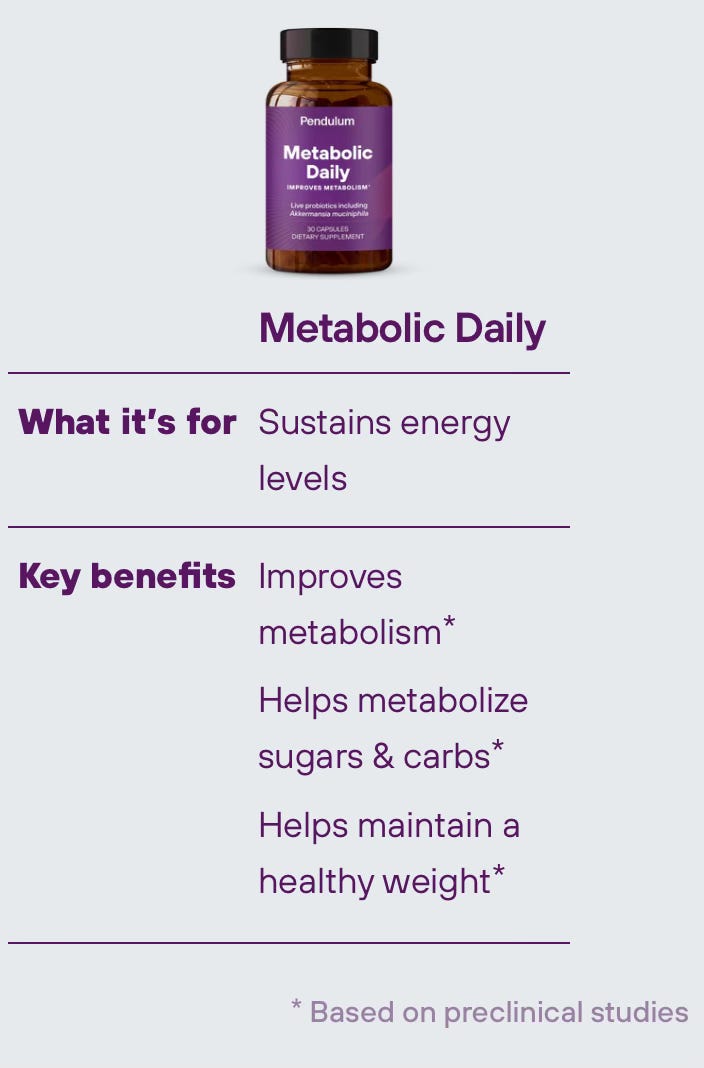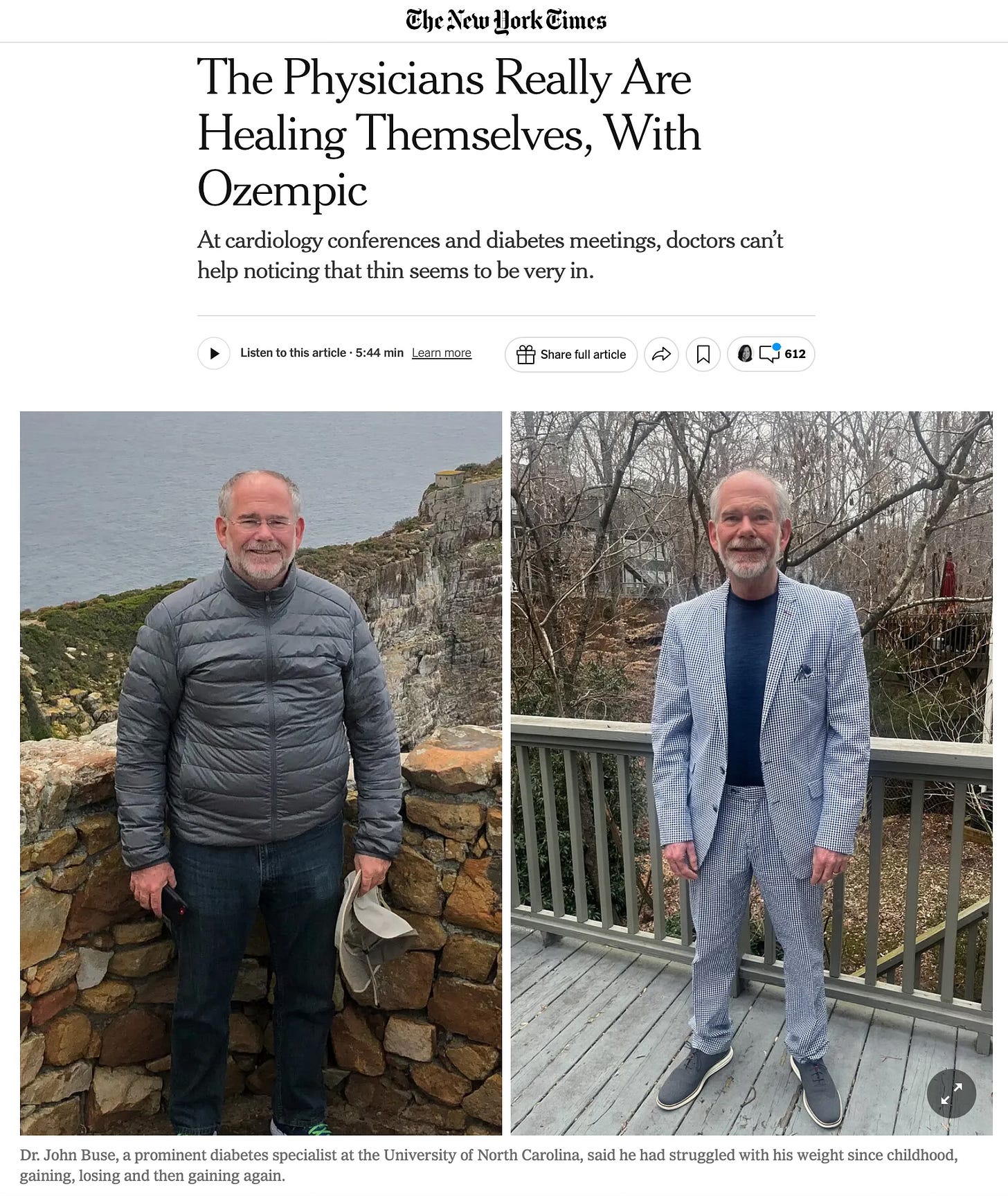I’ll focus on four related issues in this article:
Another health product promotion by another celebrity. (I’ve written about broadcaster Erin Andrews, football star Odell Beckham, Jr., and multiple celebs pushing menopause relief products.)
Another gut health product promotion (It was GLP-1 drugs yesterday.)
Another 1440 newsletter highlighting another sponsor message.
The NY Times’ Gina Kolata with a boost for the GLP-1 agonist drug market.
Although I’ve already criticized some of the practices of the 1440 newsletter, I’m still keeping an eye on them. A few days ago, the daily newsletter was sponsored by Pendulum, a microbiome products company. Microbiome? Think gut health.
After that bold banner of the “partnership” with a sponsor, the body of the 1440 newsletter included a Pendulum sponsored message. As 1440 does every day, the sponsor message looks very much like the rest of the “news” body copy. The disclaimer that this is a sponsored message is in tiny font. Before your second cup of coffee in the morning, you could easily miss that the “news” had transitioned into advertising.
So, alas, we have another celebrity health pitch - this time from the actress Halle Berry - facilitated by the paid sponsorship in the 1440 newsletter.
The sponsored message in the 1440 newsletter says that the probiotic product being promoted “is proven to reduce blood sugar spikes, lower A1C, and enhance natural GLP-1 production*.” The asterisk points to a tiny footnote that is critical. It reads:
*Based on preclinical studies
That means this claim does not come from studies in people. It’s not clear whether the asterisk applies to all 3 claims in that sentence or only the final one.
But on Pendulum’s website are claims of three “key benefits” for another product, Metabolic Daily.
Note that all key benefits have asterisks after them, signifying that these claims do not come from studies in people.
But, back to the 1440 newsletter, they want to put your mind at ease, stating in their “partner standards”:
We rigorously score and vet potential brand partners.
But as I wrote in an earlier article, 1440 provides no details on how they vet and how they score. What details stand behind those promises?
But Halle Berry - Pendulum customer, turned investor, turned corporate Chief Communications Officer - stands by the company’s claims - though her conflict of interest is evident.
That’s enough about the overlapping crossover of “news” like the 1440 newsletter, sponsored messages and advertising, and Halle Berry’s role in promoting Pendulum products.
Let’s switch focus to all of the GLP-1-related claims that are inundating the public. Just do a search on GLP-1 if you’ve not yet been inundated. Then come up for air.
GLP-1 stands for glucagon-like peptide-1. It’s a hormone that plays a role in regulating blood sugar levels and promoting weight loss. GLP-1 agonists are a class of drugs used to treat type 2 diabetes and obesity. They work by mimicking the action of the natural hormone GLP-1. Some brand name agonists are Ozempic and Rybelsus (semaglutides), Trulicity (dulaglutide), Victoza (liraglutide) - with many others in the pipeline.
Pendulum says that its GLP-1 Probiotic product - the one Halle Berry was sold on - is a “dietary supplement (that) naturally boosts GLP-1 * production. It does not contain GLP-1 and is not a GLP-1 agonist drug.” They say that it is “formulated with bacterial strains that are scientifically known to stimulate GLP-1 production * in its natural cyclical pattern in response to eating.”
Those two asterisks were placed there by Pendulum, as we saw earlier. They are followed by this footnote:
*Based on preclinical studies.
Not in people.
If your head isn’t spinning yet, it will be as the GLP-1 and related market continues to expand.
Journalist Gina Kolata, in the New York Times this week, did her part to help the Ozempic and Wegovy market, writing under this headline and photo:
But the most salient point wasn’t made until 3/4 deep in the story - long after some couch potatoes and doughnut divers stop reading. Then she reveals:
The doctors know they are privileged.
At first, Dr. Buse’s health insurance paid for his Wegovy. But soon North Carolina stopped paying for obesity drugs for state employees, so he paid out of pocket. With a list price of $1,349 a month, it was a major expense.
Then, at a meeting in Europe, he asked a colleague to prescribe Wegovy for him and got a six-month supply. Dr. Buse was able to purchase Wegovy for a quarter of what it cost in the United States.
The doctors also know how to advocate for themselves and navigate the medical system better than many of their patients do.
High drug costs, navigating the system, having access to “insider trading”……feels like a gut punch in the pursuit of gut health.












Great newsletter, Gary. So glad you're writing again.
By the way, three of the doctors in that NYT GLP-1 story (C. Michael Gibson, Darren McGuire, and John Buse) do consulting for Lilly and/or Novo. Two of their relationships are disclosed in the article. Hardly impartial judges!